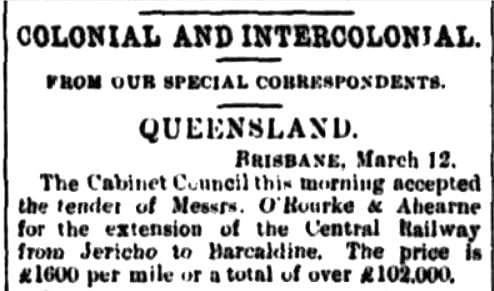
The Chosen Site
The Railway Department decided where the town of Barcaldine was to be laid down. Various reports in the Western Champion give us some idea of the close relationship between the railway and the town in the late 1880s when the line was a critical part of the town’s existence.
In September 1886 Lagoon Greek consisted of Shakespeare's Hotel, brought from Pine Hill, and a few tents; but in a few weeks the exodus set in from Jericho, and when the station of Lagoon Greek (since called Barcaldine) was opened in December, the town had assumed formidable proportions. Although '358 miles' did not terminate the section – the line being actually carried over the downs 12 miles further west – the Government promised not to open the line at the twelve mile, and subsequently further promised not to open a station between here and Longreach, 64 miles from Barcaldine, a place intended for a terminus, for some years to come. at the 358 mile mark and in transporting the people and buildings to the new settlement. The heavy line works necessitated the employment of a great number of men, and the movement of supplies provided employment for carriers. The " rush " to Barcaldine was unprecedented in the annals of Central Railway history.
Western Champion (Blackall/Barcaldine, Qld. : 1879 - 1891), Tuesday 4 September 1888
The reporter wasn’t enamoured of the town’s chosen position in the landscape, seeing it as less than ideal:
First and foremost visitors will be disappointed when they see Barcaldine. The mistakes of the Railway Department committed at Pine Hill and Jericho are repeated here, for a dustier or sandier site for a township it would be impossible to find in a day's march. The town is built on a sandy ridge, and during the dry season clouds of fine sand cover everything as with a garment. Had the site been chosen half a mile further west the sand would have been avoided, and the town built upon a sandy cum-blacksoil elevation. Teams have to plough along our main streets up to their axletrees; and the side and back streets are in a similar condition.
In 1886, the Champion’s Special Correspondent wrote:
A few short months ago the site of the now populous town of Barcaldine was a howling wilderness known only to the dingo, kangaroo, a strolling blackfellow, or perhaps occasionally to a wandering boundary rider making for the Cedar Waterhole to replenish his water bag. Now - what a difference! It is almost impossible to imagine that a town of such magnitude as Barcaldine could arise (the best word I can find) in such a short space of time. But labor omnia vincit, and truly in this case labor has conquered the desert and transformed it into the largest, the most populous, and, it is to be hoped, the most permanent town on the Central line. Immediately the opening of the line to here became an accomplished fact, the great "rush'" set in, "pulling down" commenced in Jericho, and "putting up" began at Barcaldine. People of all degrees, trades, and professions made preparations for a move, the Railway Department was besieged with applications for trucks in which to convey the food, chattels, and effects of the multitude to the new El Dorado.
The Railway Department appears to have been pivotal in every aspect of the settlement process, acquitting itself well in the estimation of the newspaper reporter:
The traffic arrangements were excellent, and very few complaints are to be heard of any of the aforesaid goods, chattels, and effects being missing or injured. There being no storage accommodation at this end delivery had to be taken from the trucks, but thanks to the energy; and perseverance of Mr. Best (Station Master) and his foreman, Mr. Moxley, assisted by an efficient staff there was no blundering such as we have witnessed on similar occasions in the past. All goods being carried at owners' risk the Railway Department was not responsible for loss or damage, but that fact did not seem to make any difference to the officials, who were as careful of the goods, chattels, and effects aforesaid as if they had been their own property.
The railway buildings were rapidly erected under the supervision of Mr. Wotherspoon, the contractor:
At present about 100 feet of the goods shed is completed, and is being used for the storage of perishable goods. Another 100 feet is to be erected to complete the shed, and this is expected to be done in a fortnight. The woolshed will be erected at the same time, as also the station, offices and carriage shed. All those buildings have been moved from Pine Hill, and will be erected here in a similar manner to those at the latter station. That is to say the goods shed is in the street, the wool shed being at its eastern end. The station offices will be on the opposite side of the line, and the carriage shed will be between the two, or over the line. Several porters' cottages are approaching completion; the station master's house, a fine roomy one, is completed, and the telegraph manager's nearly so. The telegraph office accommodation is simply execrable. Fancy two operators, a line repairer, and a messenger packed into one little room with two instruments and the usual impediments of a telegraph office. Talk about room for swinging a cat! Why there is not room for an operator, if he wears anything over number tens, to turn round himself much less swing a cat. Then the outside accommodation is equally disgraceful. Until a few days ago, the public were obliged to write their telegrams upon a little ledge exposed to the full glare of the sun or the fury of the elements, as the case might he. A little agitation, however caused the department to build a small room, which is a great improvement. Mr. Ryland, the telegraph manager now has the whole work of the office thrown upon his hands. His Assistant has been moved to Jericho to fill a vacancy. It is to be hoped, however, that another will be Appointed in his place immediately as the work is absolutely "killing" for one.
The Railway Department were also responsible for the sheep yards.
Cattle and sheep yards are to be erected immediately but as some large number of sheep are to be trucked to Rockhampton before Christmas, temporary yards will be erected to receive them. . . Some difference of opinion exists as to the location of the cattle and sheep yards. The proposed site is close to the triangle and, in the opinion of gentlemen conversant with the details of trucking, altogether unsuitable. Mr. Gray, the well-known sheep drover, gives it as his opinion, that the yards should he placed at such a distance from the main line, that the noise of the engines and traffic would not rouse the sheep and cattle. Mr. Gray says that at Jericho the yards are placed near the line, consequently the sheep are roused about all night, and when put into the trucks next morning they lie down and get smothered. The same gentleman suggests that two sheep yards, of 6000 and 2000 capacity, should be constructed at Barcaldine in order to facilitate counting when delivery has to be taken-as some times happens-at the terminus. The opinion of this gentleman, considering his vast experience amongst sheep must carry weight, and it is to be hoped that the Railway Department will see the advisability of erecting the yards as far as possible from the main line.
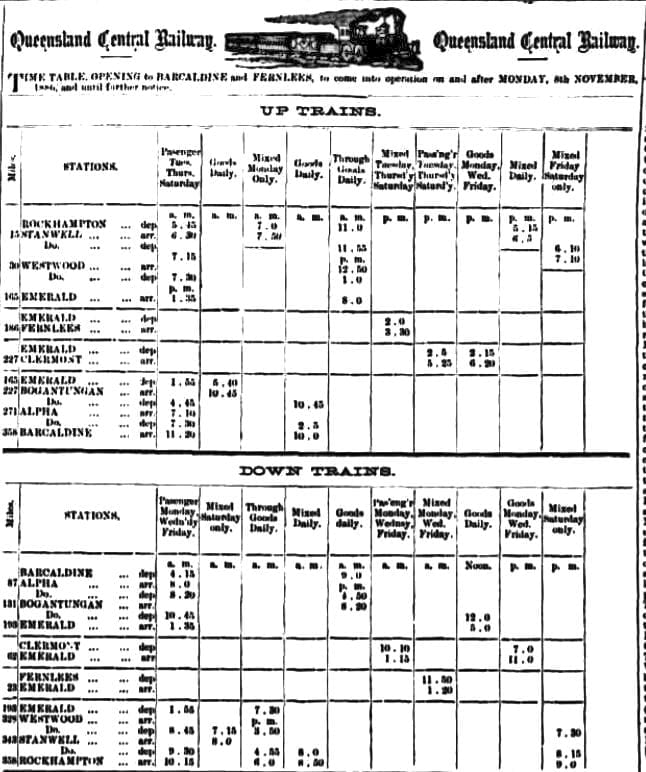
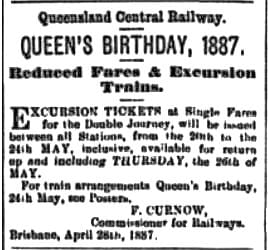
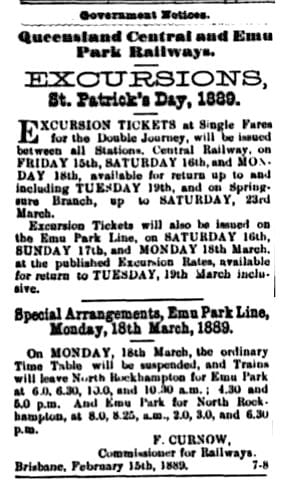
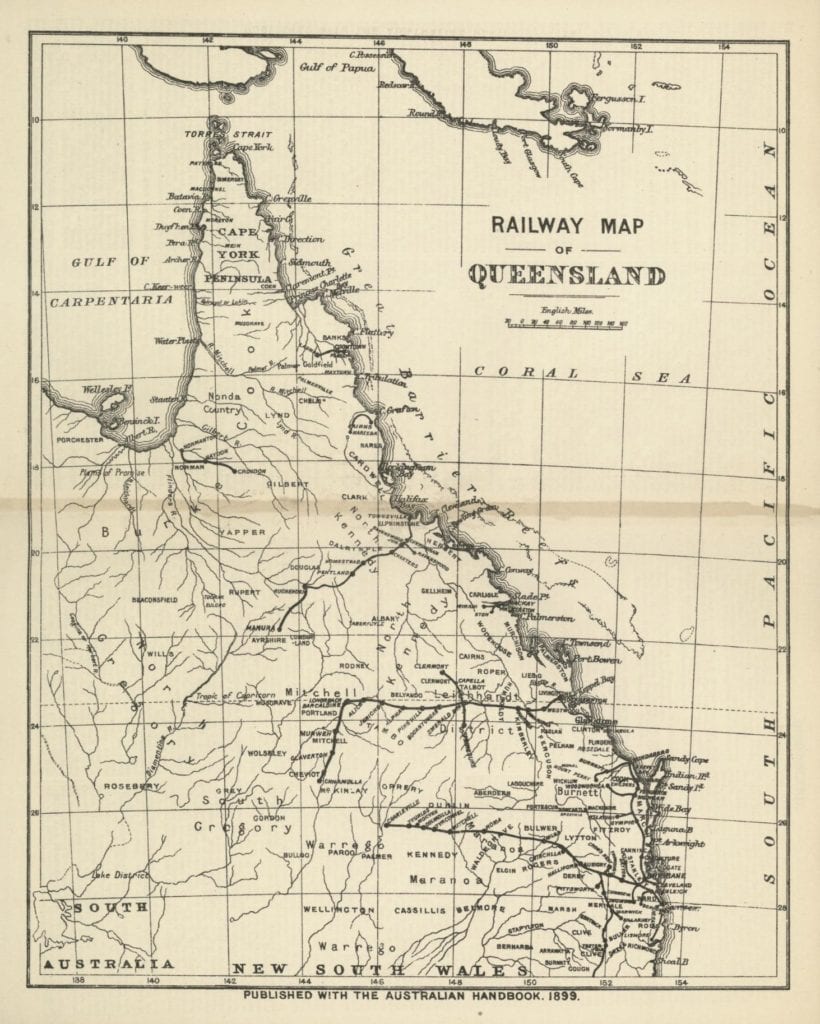
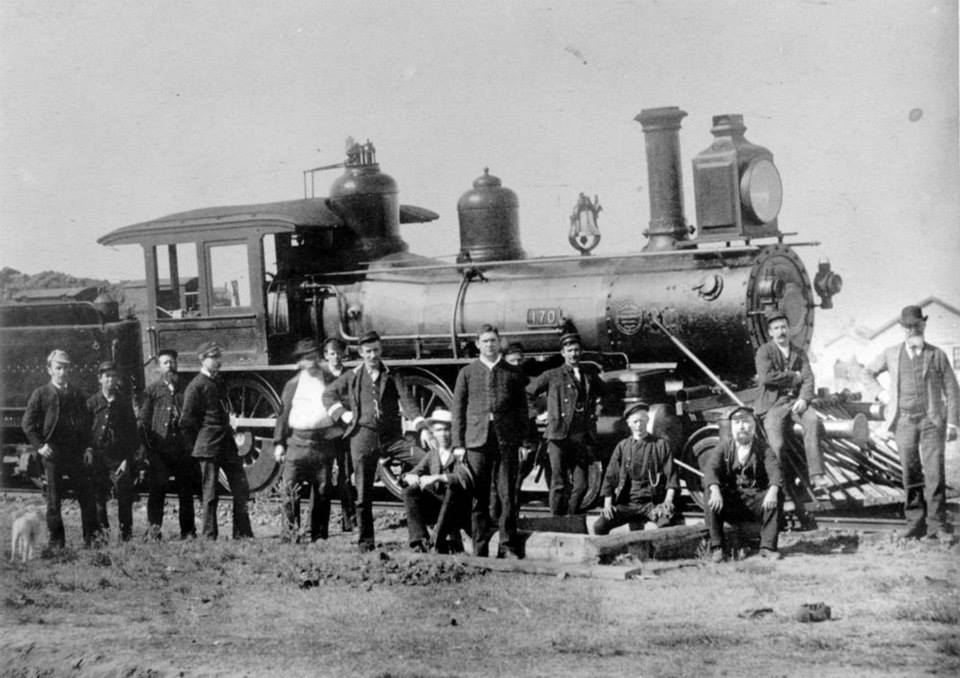
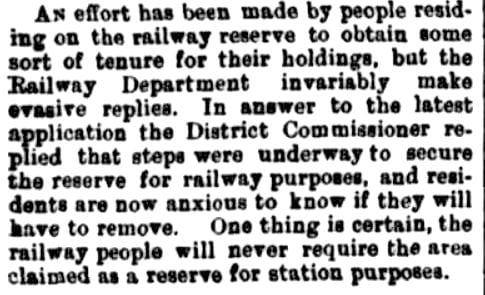
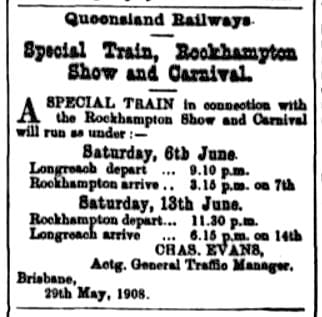
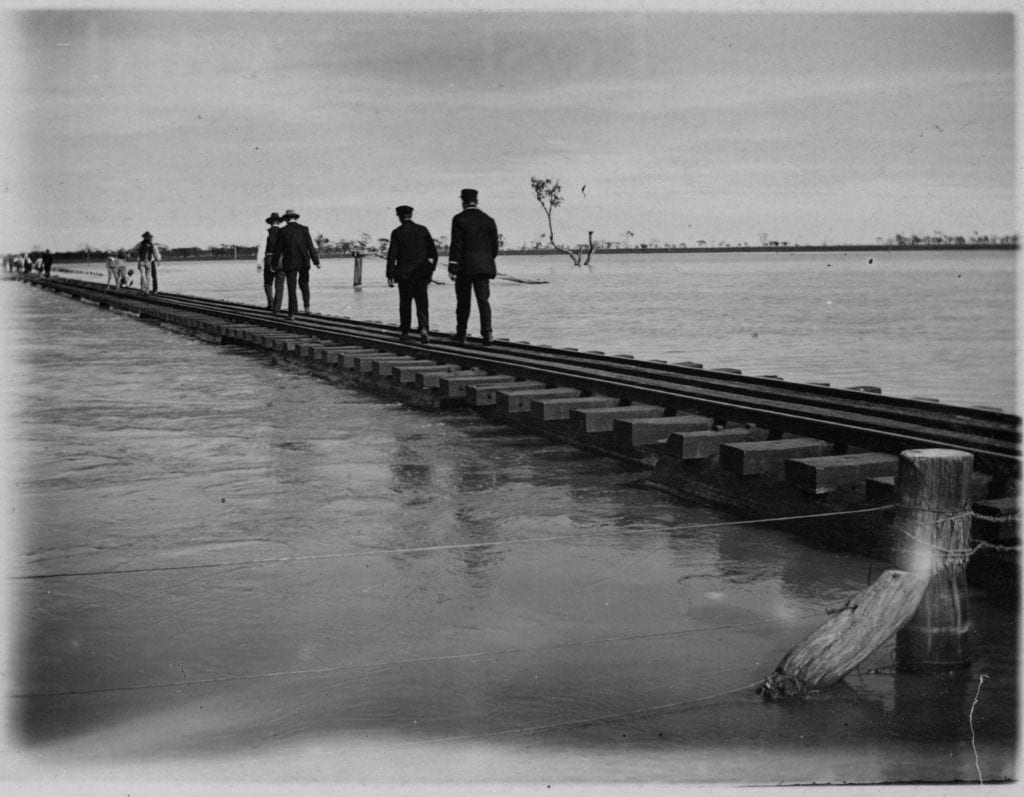
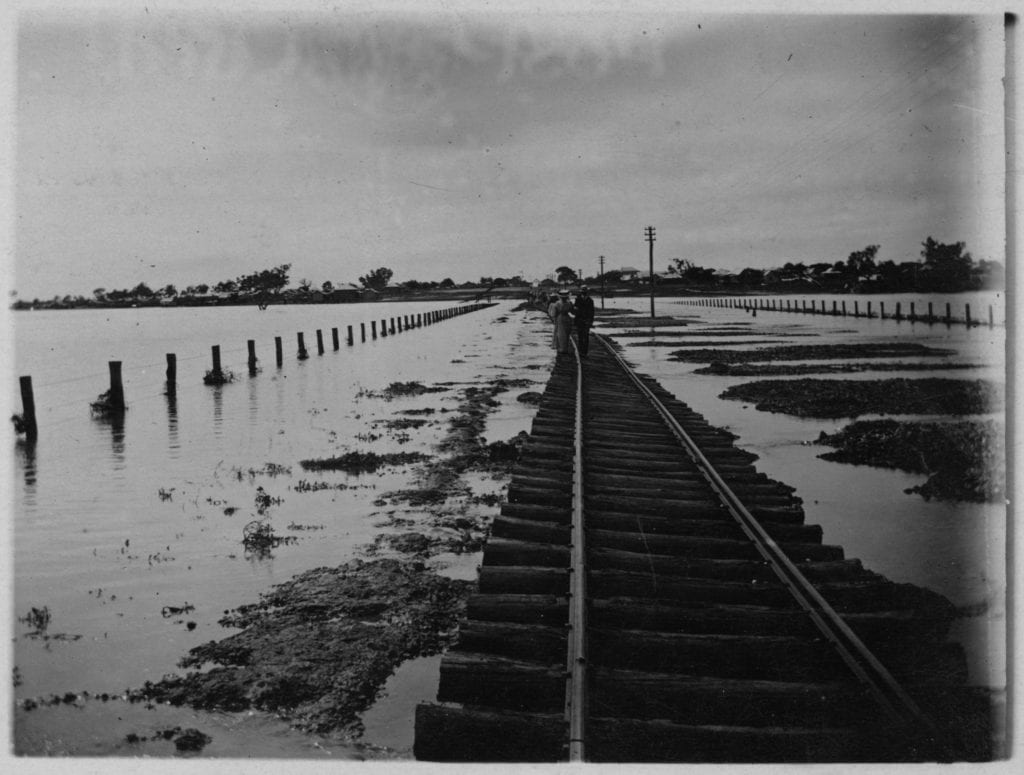
Queensland Rail in Barcaldine - modern era
Queensland Rail still has a connection with Barcaldine but it is vastly different to what it was. Gone are the days of rail building, replaced with track maintenance.
There are now only two passenger train services per week through Barcaldine from Brisbane – the Spirit of the Outback. The train turns around at Longreach – Winton is no longer on the service. The train station is unattended by staff although there is still a State Government railway department office in a building next to the train station. There is also still a railway work gang stationed in Barcaldine but it is a much reduced unit.
